Key takeaways:
- Documentaries effectively raise awareness on social issues, fostering empathy and encouraging action among viewers.
- Streaming platforms enhance accessibility, allowing diverse voices and perspectives to reach a global audience and spark meaningful conversations.
- Impactful documentaries, like “13th” and “The Act of Killing,” can ignite uncomfortable discussions and provoke personal reflection on societal injustices.
- Choosing documentaries that evoke curiosity, emotional resonance, and diversity deepens understanding and drives social change.
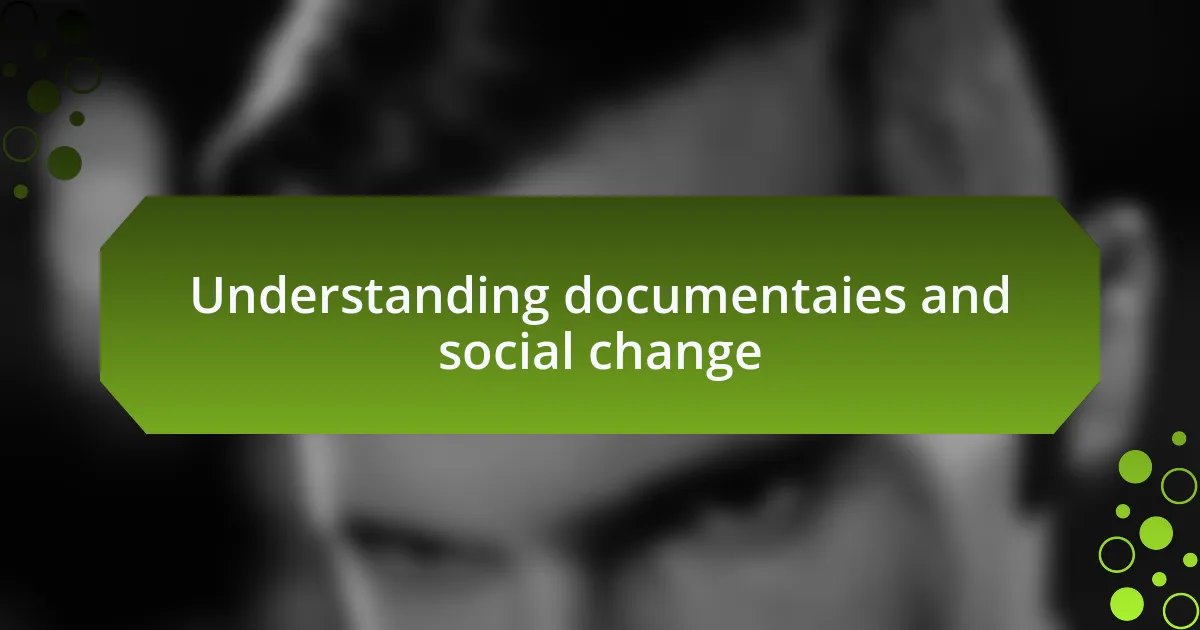
Understanding documentaies and social change
Documentaries serve as powerful tools for social change by shedding light on critical issues often overlooked or misunderstood. I remember watching a documentary about climate change that left me both shocked and motivated. It made me question my own impact on the environment and inspired me to make small, sustainable changes in my daily life.
When a documentary presents real-life stories, it fosters empathy and a deeper understanding of diverse perspectives. I’ve noticed that discussing these films with friends often leads to passionate conversations about social justice, highlighting how narratives can unify people around common causes. How often do we pause to think about the stories behind the headlines? Documentaries encourage us to engage with these narratives.
Moreover, the emotional weight of a good documentary can provide the push needed for action. I once watched a film focused on food waste, and it struck a chord with me—seeing the stark imagery of discarded food made me rethink my own habits. Have you ever felt that moment of awakening while watching a film? It’s this kind of transformative experience that documentaries can ignite, driving home the importance of social responsibility.
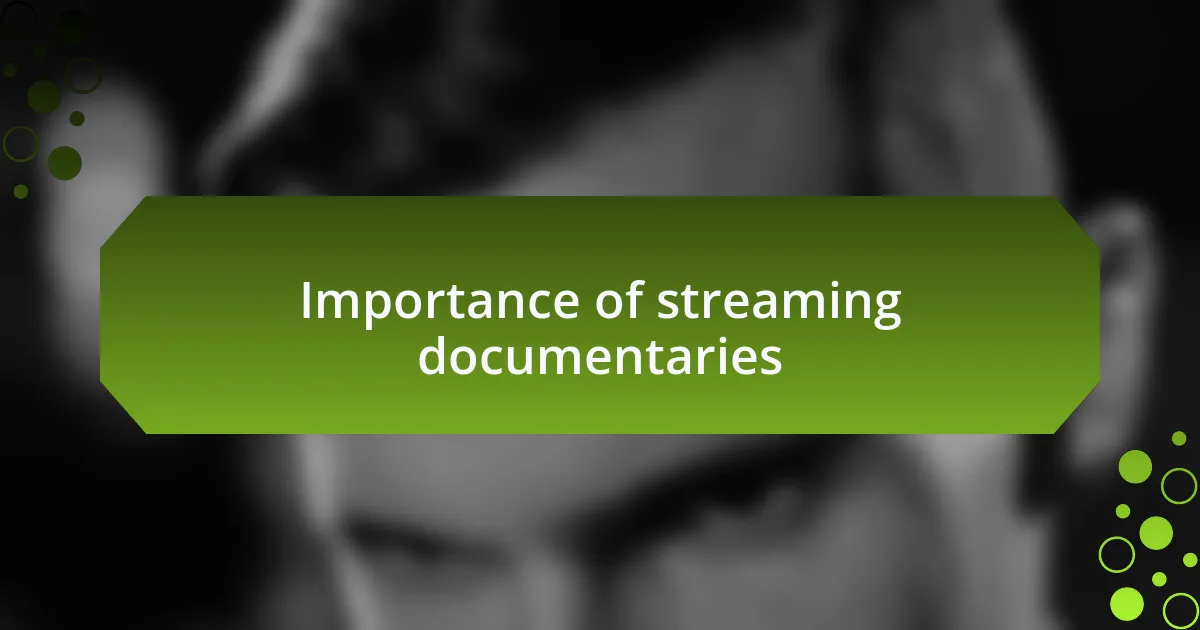
Importance of streaming documentaries
Streaming documentaries hold significant importance as they provide accessible platforms for voices that often go unheard. The first time I streamed a documentary about the lives of refugees, it opened my eyes to their struggles and dreams in a way that news reports never could. Isn’t it astonishing how a simple click can transport us into someone else’s reality, encouraging us to advocate for change?
The beauty of streaming lies in its convenience; we can watch powerful documentaries from the comfort of our homes. I recall one weekend when I binge-watched a series focused on systemic racism. As I absorbed the stories and statistics, I found myself discussing them with my family. This type of engagement, made possible by streaming, transforms passive viewing into active conversations that can lead to genuine action.
Moreover, streaming platforms amplify the reach of impactful documentaries, allowing them to touch lives worldwide. I remember sharing a thought-provoking documentary on social media that sparked discussions among my peers. It’s clear that each share can extend a documentary’s influence, urging others to reflect on their beliefs and motivations. Have you ever considered how your viewing choices can ignite a ripple effect in your community?
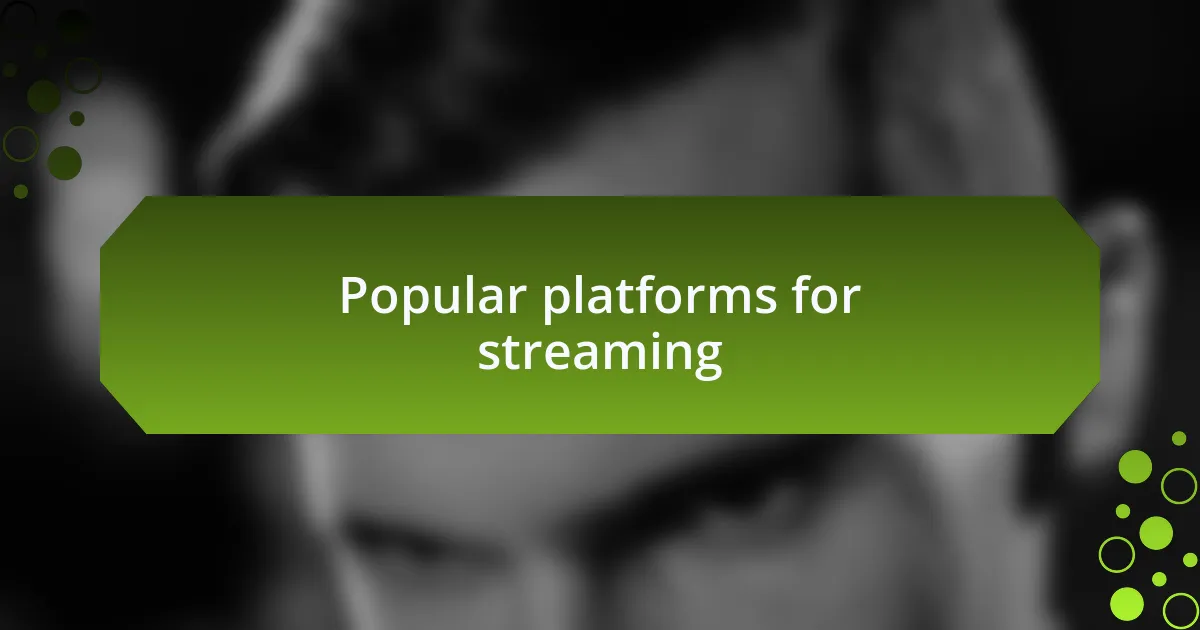
Popular platforms for streaming
When it comes to popular platforms for streaming documentaries, a few names consistently pop up. Netflix, for instance, has revolutionized the way we consume content, offering a vast library that includes everything from environmental issues to social justice. I remember scrolling through their documentary section and stumbling upon a film about climate change; it captured my attention and, surprisingly, ignited a desire to learn more about sustainable practices.
Another noteworthy platform is Amazon Prime Video, which provides an impressive selection of documentaries as part of its membership. I once watched a gripping series on mental health issues that left me reflective for days. It made me question how we view mental health in our society and, more importantly, inspired me to check in on friends who might be struggling. Have you ever felt a documentary prompt you to take action in your circle?
Hulu also deserves a mention, particularly for its unique selection of socially relevant documentaries and docuseries. There was a time when I was looking for something poignant but thought-provoking, and Hulu did not disappoint. One show, which focused on the challenges faced by marginalized communities, prompted me to start volunteering. It’s incredible how a documentary can be the catalyst for personal change, don’t you think?
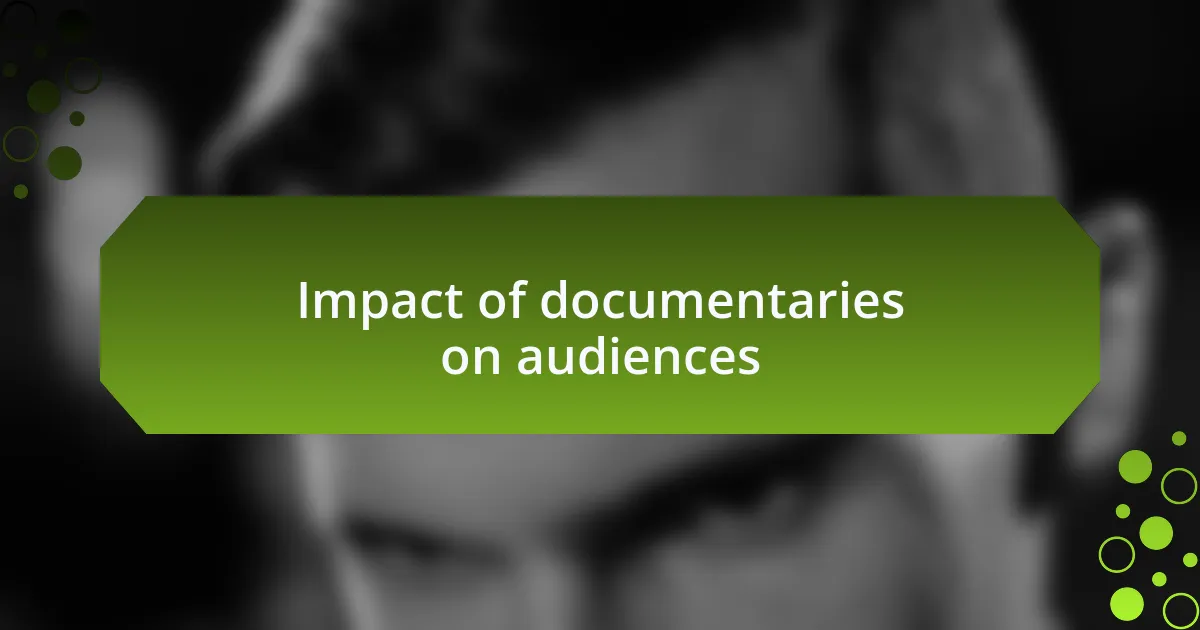
Impact of documentaries on audiences
Documentaries have a profound ability to evoke emotions and instigate change in viewers. I recall watching a film about ocean conservation that struck a chord with me. The haunting images of polluted waters lingered in my mind, sparking an urgency to reduce my plastic use. Isn’t it fascinating how a few carefully crafted visuals can shift our perspective so dramatically?
The impact of documentaries goes beyond merely informing; they can inspire action and foster empathy. After viewing a powerful narrative on homelessness, I found myself participating in local outreach initiatives. It made me realize that these stories aren’t just statistics; they represent real people with real struggles. Have you ever watched something that made you not just see the world differently but also feel compelled to make a difference?
Moreover, documentaries often create a sense of community among viewers. When I joined an online discussion after watching a thought-provoking piece on climate activism, I connected with individuals who were equally passionate about the cause. It was a reminder that we are not alone in our struggles or hopes. Isn’t it powerful to know that a shared viewing experience can lead to collective action?
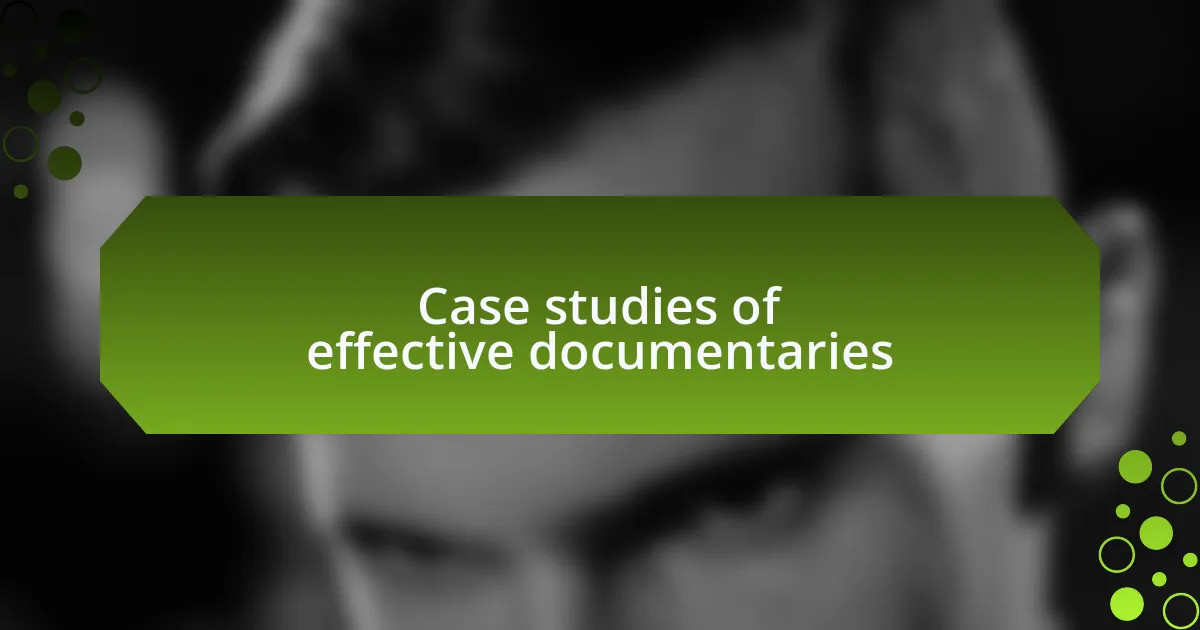
Case studies of effective documentaries
The documentary “13th” by Ava DuVernay stands as a potent case study of social impact, examining racial inequality and the U.S. prison system. I still remember the first time I watched it; the statistics and personal testimonies hit me deeply, revealing just how systemic and pervasive these issues are. It was like pulling back the curtain on a hidden reality—how many others might remain unaware of these injustices until they see them laid bare?
Another compelling example is “The Act of Killing,” which challenges conventional views of war and violence. As I reflected on the chilling reenactments, I felt a disturbing mix of horror and fascination. It raised the question, can we truly confront our past if we don’t recognize the humanity of those involved? The film propelled discussions worldwide about genocide and accountability, demonstrating documentaries’ unique power to force uncomfortable conversations.
Additionally, “Won’t You Be My Neighbor?” about Fred Rogers not only revived nostalgia but also inspired viewers to embrace kindness and compassion in their daily lives. After watching it, I found myself reaching out to friends with little gestures of kindness—simple notes or coffee catch-ups. Isn’t it interesting how a biographical documentary can encourage acts of love in a world that sometimes feels divided?
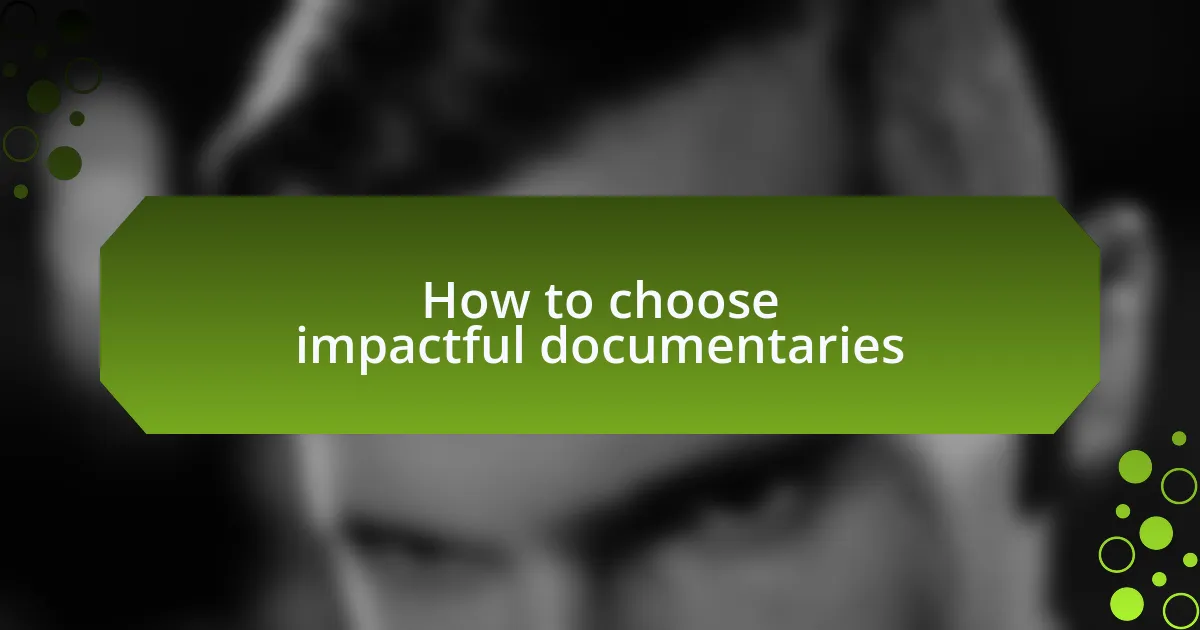
How to choose impactful documentaries
When choosing impactful documentaries, I often look for films that spark curiosity about pressing social issues. For instance, if a documentary centers on a topic I know little about, it immediately catches my eye—it feels like an invitation to learn. Have you ever paused a documentary just to dig deeper into a topic that intrigued you? That curiosity is a powerful catalyst for change.
Another key factor I consider is the emotional resonance of the film. A documentary that evokes strong emotions tends to stick with me long after viewing. I remember watching “My Octopus Teacher,” and it was more than just a story about nature; it stirred feelings of connection and respect for the environment. It made me think, how often do we take the time to reflect on our relationship with nature? When a film elicits such questions, it amplifies its impact.
Lastly, I lean toward documentaries that include diverse voices and perspectives. This approach enriches the narrative and offers a broader understanding of social issues. For example, “I Am Not Your Negro” showcases James Baldwin’s insights, and I found his reflections incredibly poignant. It made me reconsider how important it is to listen to varied experiences. Have you ever felt a documentary shaped your understanding of a community that was previously unfamiliar to you? Embracing these diverse narratives can be a transformative experience for both the viewer and society at large.